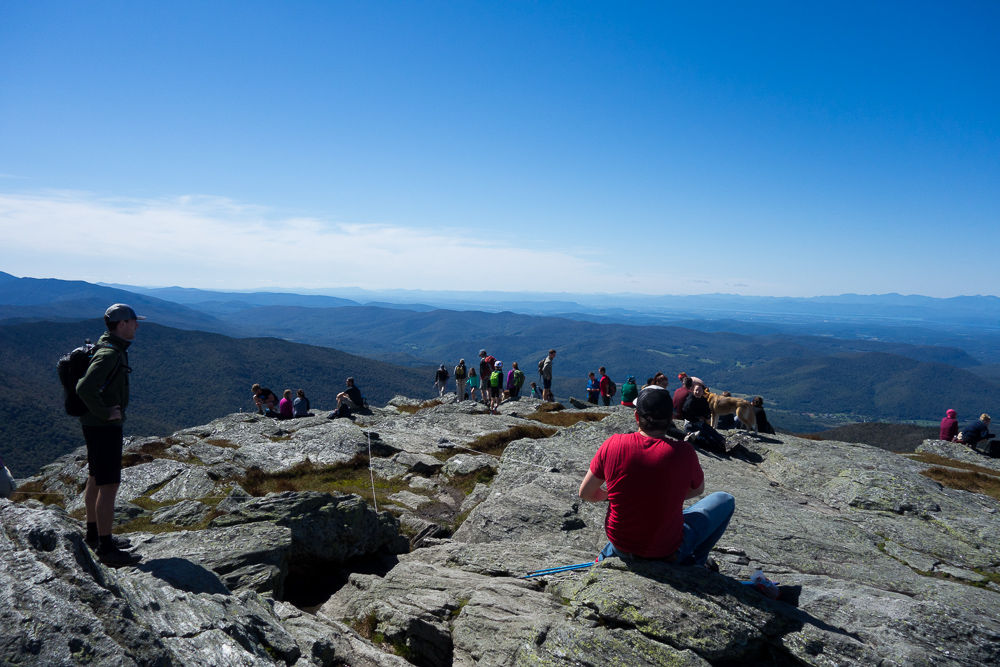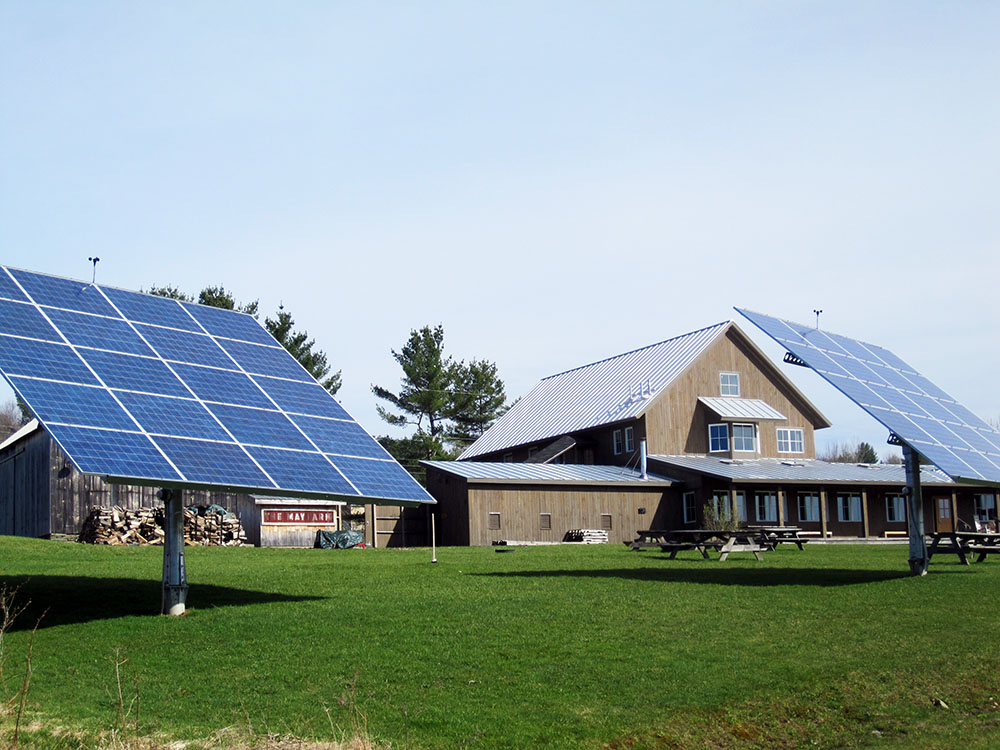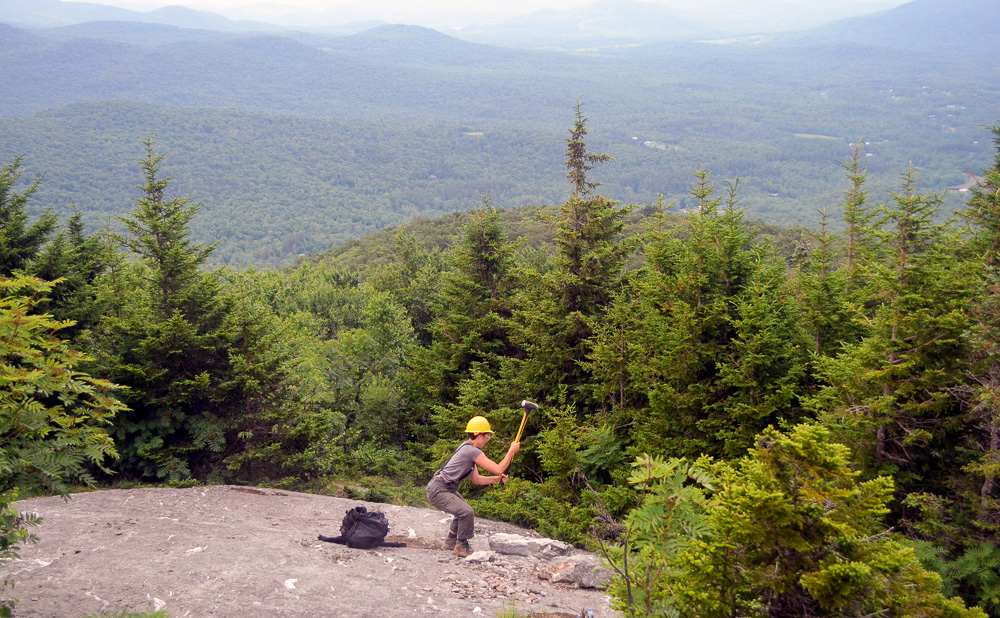The implications of climate change have led GMC to more urgently focus on reducing its carbon footprint and improving sustainability practices. Climate change is a global problem effected by, and affecting, everyone on the planet. In Vermont, GMC is already witnessing higher intensity storm events and erosion throughout the Long Trail System requiring additional staff and volunteer maintenance during an ever-increasing hiking season. At GMC, in our daily operations, we strive for sustainability and seek ways to minimize greenhouse gas emissions. We have adopted a strategic plan to guide us toward best practices as we design and manage our trails and supporting facilities to withstand increased hiker use and impacts of a changing climate.
The following are examples of what the Club has done or is doing to reduce its carbon footprint and improve sustainability:
GMC Campus and Facilities
The GMC’s Headquarters facility is designed, built, and maintained to be environmentally advanced, energy-efficient, and a healthy space for all.
- Structure: The timber frame building is built with locally sourced wood (all within 50 miles of the building) that was ecologically harvested according to Vermont Family Forests standards. The building utilizes rough cut lumber and natural wood sheathing and siding rather than plywood and other engineered building materials for nearly all building components.
- Heating, Hot water, and Electricity: GMC is 100% powered by renewable energy for our heating, hot water, and electricity needs. The building’s orientation and window design allows us to strike a balance between natural daylighting, allowing for passive solar heating in the winter and minimizing solar gain during the summer, and electric light. Centrally located, high-efficiency biomass wood-burning boilers heat all of our structures as well as all hot water. All of GMC’s electric needs are met with power from the sun.
- Water Conservation and Waste Management: Three bathrooms in the Visitor Center utilize Clivus Multrum composting toilet systems. Flush toilets on campus utilize a dual flush system to minimize water usage. 100% recycling and composting efforts are employed throughout the facilities. The Club uses FSC-certified paper products and whenever possible, all consumable products are sustainably sourced and contain the highest level of post-consumer waste available.
GMC Lands and Trails
- GMC-owned properties (3,483 acres) are managed for recreation, conservation of natural communities, forest connectivity, and sustainable forestry with the goal of supporting VT’s local forest industry. GMC-held easements (17,155 acres) are stewarded for recreation, natural habitat, forest connectivity, and sustainable forestry.
- The Club strives to utilize local, natural materials for trail infrastructure such as native stone, wood, and bark mulch. Our trail design and management practices are focused on long term durability to protect environmental and water quality. Through innovative design and quality building, we can prolong the life of trail infrastructure, minimizing future costs and maintenance.
- Hand tools are primarily used for maintaining the 500+ miles of the Long Trail System. Where chainsaws are utilized for trail work, vegetable-based bar oil is used.
- The Club operates over 60 backcountry privies that are designed and managed to sustainably treat backcountry human waste onsite while protecting environmental and water quality.
GMC Operations and Finances
- In 2016, the GMC began tracking fossil fuel exposure of its invested funds. In 2019, the GMC Board of Directors approved a revised endowment policy that includes development of a plan to achieve environmental, social, and governance goals within its invested endowment funds.
- GMC has upgraded its fleet of vehicles to improve dependability, safety, and fuel efficiency.
- Staff are able to work flexible schedules including the opportunity to work remotely regularly and use less gas.

The Club has a responsibility to improve its own practices to become more sustainable and reduce its carbon impact. While we have made some meaningful progress, there is more that we can do. As a leading non-profit conservation organization in Vermont, we also have a responsibility and opportunity to demonstrate leadership and serve as a model for others. We look forward to actively taking more steps in the right direction.
Want to learn more about climate change? Vermont’s own Bill McKibben will be joining the GMC Bread Load Section for their annual meeting in March! On Thursday, March 26th, beginning at 6:30 PM, the Bread Loaf Section will hold its 45th Annual Meeting at the Champlain Valley Unitarian Universalist Society meeting space at 2 Duane Court in Middlebury. The meeting will begin with a brief social time and hearty refreshments, followed by a business meeting. Following the business meeting, at 7:30 PM, Bill McKibben will present a special program that is sure to inspire: “The Climate Fight, A Report from the Front.” An author, environmentalist, and activist, Bill McKibben is the Schumann Distinguished Scholar in Environmental Studies at Middlebury College. In 1988 he wrote The End of Nature, the first book for a common audience about global warming. His most recent book is Falter, Has the Human Game Begun to Play Itself Out? He is a co-founder and Senior Advisor at 350.org, an international climate campaign that works in 188 countries around the world.





















Mike, these are all really positive steps and you all should be applauded for everything you do. One question is what are you doing with records management given the carbon impact that servers have, there is a “hidden” impact from electronic storage. Would be curious about your thoughts.
I’ve long been pleased that the club installed Clivus Multrum composting toilets at headquarters. They’re a great way to save water and energy, prevent pollution of the water table, and recycle nutrients.
My wife and I installed the fifth Clivus Multrum manufactured in the U.S. in our off-the-grid house in 1974. They were then manufactured at Scheel Yachts in Rockland, Maine, and we car-topped the two halves of the composting tank from Rockland to Vermont. The system was still working well when we sold the house 29 years later.